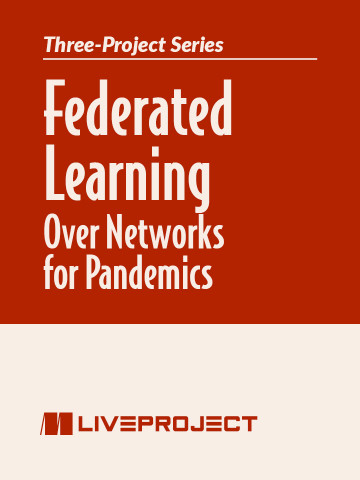- prerequisites
- intermediate Python • basics of data science
- skills learned
- basic flow control in Python • learn the weights of a linear classifier using gradient descent • implement a FL algorithm by combining gradient descent with a simple averaging scheme
pro $24.99 per month
- access to all Manning books, MEAPs, liveVideos, liveProjects, and audiobooks!
- choose one free eBook per month to keep
- exclusive 50% discount on all purchases
- renews monthly, pause or cancel renewal anytime
lite $19.99 per month
- access to all Manning books, including MEAPs!
team
5, 10 or 20 seats+ for your team - learn more

In this series of liveProjects, you’ll extend and upgrade basic machine learning techniques like linear regression to build a powerful tool that can make personalized predictions of an individual's COVID-19 infection status. You will apply federated learning techniques to train a machine learning system on a (fictional) dataset of smart phone data. Federated learning is a new ML paradigm used for the collaborative training of models from heterogeneous and distributed data such as audio recordings generated by smartphones. This liveProject series will teach you how to use federated learning techniques to exploit the intrinsic network structure (“contact networks”) between audio recordings in order to learn optimal model parameters for each individual. Federated learning techniques are privacy-friendly as they do not require the sharing of sensitive private data, such as audio recordings of smartphone users.
here's what's included




team
- five seats for your team
- access to all Manning books, MEAPs, liveVideos, liveProjects, and audiobooks!
- choose another free product every time you renew
- choose twelve free products per year
- exclusive 50% discount on all purchases
- renews monthly, pause or cancel renewal anytime
- renews annually, pause or cancel renewal anytime
-
![]() Federated Learning Over Networks for Pandemics project for free
Federated Learning Over Networks for Pandemics project for free
Prerequisites
This series of liveProjects is for Python data scientists interested in applying big data analytics to public healthcare. To begin this liveProject you will need to be familiar with the following:
TOOLS
- Intermediate Python
- Basic methods for storing and manipulating numeric arrays using Python package NumPy
- Basic plotting using the Python package matplotlib
- Basic methods for processing geographic coordinates using Python package GeoPy
- Basics of NetworkX for storing and manipulating networked data
- Basics of machine learning
- Basics of data science
 features
features
- Self-paced
- You choose the schedule and decide how much time to invest as you build your project.
- Project roadmap
- Each project is divided into several achievable steps.
- Get Help
- While within the liveProject platform, get help from fellow participants and even more help with paid sessions with our expert mentors.
- Compare with others
- For each step, compare your deliverable to the solutions by the author and other participants.
- book resources
- Get full access to select books for 90 days. Permanent access to excerpts from Manning products are also included, as well as references to other resources.

 Federated Learning Over Networks for Pandemics project for free
Federated Learning Over Networks for Pandemics project for free